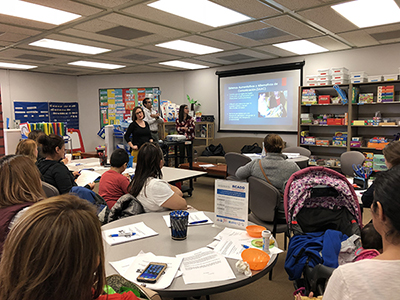Community-Based Interventions: Access to Assistive Technology for Latinos with Disabilities: Success Comes from Collaboration (IL UCEDD/LEND)
June 11, 2018

|
By: Angélica Martínez Pérez, AUCD LEND Trainee (2017-2018) and UCEDD Diversity Fellow (2016-2017)
Although Hispanics are the largest minority in the U.S., research indicates that there is a significant gap in knowledge about assistive technology (AT). Over the course of three years, I have been collaborating with the Assistive Technology Unit (ATU) located at the University of Illinois at Chicago and The Autism Program of Illinois in order to provide Latinos with disabilities (LWDs) and their families with culturally and linguistically relevant resources about AT.
As a UCEDD Diversity Fellow (2016-2017), I had the opportunity to run Bilingual Make-and-Take sessions for LWDs and their families to create their own visual supports and present an all-Spanish workshop about AT. I also developed a Bilingual AT toolkit for people with disabilities and their families to use in order to learn more about the AT services available in the Chicagoland area. This was just the beginning. As I began to work with families, I became more aware of the scope of barriers to access to AT services for LWDs and their families and I sought the help of my colleagues.
As a LEND Trainee (2017-2018), I had the privilege of networking with people from different disciplines sharing similar interests. Here, I was able to collaborate with Ellyn McNamara, a trained Bilingual Speech Language Pathologist and Disability Studies Ph.D. candidate, and Gabriel Anzueto, a Bilingual Developmental Pediatrician. Together, we reached out to different community-agencies serving LWD in order to provide them seminars about AT in either Spanish or English. We tailored each of the presentations towards the group's specific interests and needs. Our aim was to initiate conversations about AT, disseminate more information about AT, and inform participants about their rights; all in an effort to bridge the knowledge gap among Latinos. As a team, we combined our different skill sets in order to provide LWDs with culturally and linguistically relevant workshops about AT.
In addition, we developed a Bilingual AT resource directory which included a growing list of AT clinics, AT funding resources, and loan/donation centers available in the Chicagoland area. This resource was provided to individuals participating in the presentations, people contacting the ATU requesting services, and even individuals that came to see our LEND Leadership project poster presentation.
Although we faced challenges when starting this project, in the end, the project was and still is very rewarding. Everything we accomplished speaks to the importance of health promotion and cultural disability ethics, making our work groundbreaking.
This experience highlights the importance of collaboration between disciplines. Our community-based interventions to LWDs would not have been successful if it were not for our collaborations. Our presentations would not be possible without the support of community agencies and the participants coming to learn new information. Both the community agencies and participants provided us with feedback that was key to include in future presentations to provide the people with information relevant to their life. Traditionally the fields of Disability Studies, Speech and Language Pathology, Public Health, and Developmental Pediatrics tend to work in their own niches; however, our work demonstrates the benefits and need for more collaboration between disciplines. Putting our differences aside, working together, learning from each other, integrating our skill sets, sharing our tools, and growing together is the true sense of collaboration and interdisciplinary work. Thus, I believe that collaboration is essential in order to create movements, change policy, and positively impact communities.
As result of this project, there has been a surge in requests from community agencies serving Latinos for more presentations about AT. Further, the office of Senator Duckworth has extended an offer to support our efforts to bring increased awareness of AT services to the Latino community. We are thrilled to do this work which we believe can make a difference in peoples' lives by providing them with vital information that could improve their quality of life. We will continue to work with community agencies providing them with informative sessions about AT services and resources. Furthermore, we aim to present this project at the AUCD 2018 conference.
Next steps include presentations on AT to health care providers, and to increase the scope of family outreach to more types of community agencies, such as early intervention programs. In the end, my ultimate goal is to make this work a multilingual effort in which people from other minority backgrounds and non-English speakers can benefit from information about AT services and resources and service providers will be knowledgeable about AT needs of diverse communities. As Public Health professional and Disability Studies scholar, I want to bridge the gaps in health disparities in the Latino disabled community in order to promote and achieve real health equity.







